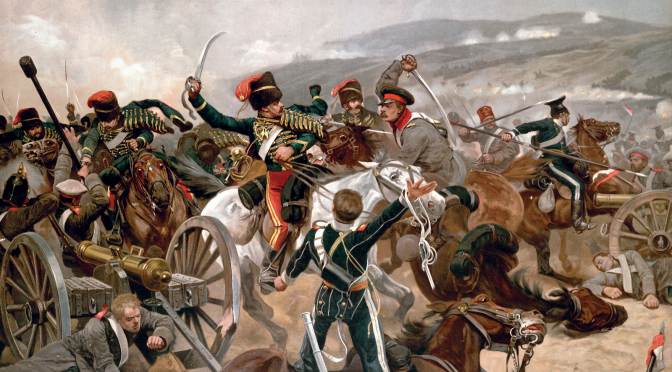Bad puns aside, the recent intrigue in Crimea has been responsible for more nonsensical political blustering than any single international incident in the past decade. It has been a curious exercise to sit back and watch everyone work themselves up and deliver half-baked analyses based on laughably outdated assumptions. Please note that all of my assumptions are fully baked.
Lest I sound arrogant, I’m not going to excoriate everyone who has commented on the new ‘Cold War’, nor should I. But I am going to address those people who are attempting to understand this as a Russia vs. the West conflict. Truth be told I am only doing this however because these sorts of idiots are the low-hanging fruit of the political blogging enterprise, and I am very rust. If you think that Putin is trying to reassemble the Soviet Union or that the United States needs to take firm military action, you’ll do well to read this, or at least consider re-enrolling in middle school.
So why are these people idiots? Because they ignore the massive and fundamental changes to the Global political landscape of the last thirty years. The world is no-longer bi-polar. Military, political, and economic power has been distributed dramatically. Perhaps more importantly, military, political, and economic ties have become much more complicated, and no longer follow the ideologies of the post-war era. In reality though, if you are reading this you probably already know that; but have you considered just how profound a change this is? Political System is no longer the course on which flows of economic and political activity show. Rather, wealth and influence is now spread through trade liberalization and foreign direct investment, and basically comes and goes in the ubiquitous shipping container. For better or worse, the ‘globalization’ of economic activity through economic liberalization, free trade agreements, and new technologies has served to replace Ideology as the organizing principle of global power structures. America led the West during the post-war period because it was a Democracy with the largest military and economy, and Russia led the ‘East’ because it was the most populous and strongest Non-democratic state. The Cold War was possible because these two entities were able to exert their authority purely as a result of their clout and size.
The current environment is difficult to render in a simple dichotomy, but the fundamental difference is that power isn’t aligned along these same structures, and is instead aligned along economies (national or as trade blocs) that are heavily integrated outside of those traditional structures. Take China; China is ‘opposed’ to the West to be sure, but the economic expansion that allowed it to become a major international power is what also keeps it tethered to the wider global community. In 1980, exports made up 10% of China’s GDP (or approximately $30 billion). In 2013 exports made up 27% which comes to $2.5 trillion or a nine-fold increase. While some of these exports obviously go to places like Russia, North Korea, Vietnam, etc. this demonstrates how critical economic integration is to China. If we factor in the imports necessary to maintain this manufacturing economy then half of China’s economy is dependent on access to foreign markets. For a country and political body that is obsessed with stability and growth China can no more afford a serious conflict with its neighbours than it could to just let half of its population starve to death.
So why do I keep talking about China in a post that is ostensibly about Crimea and the Battle of the Cold War Superstars? Well, the answer to that question is fairly straightforward; Russia cannot rebuild the USSR any more than China can isolate itself from the West; it’s political stability and economic health depends on access to trade markets and foreign investments that are colour-blind when it comes to ideology. Putin can’t even assemble a regional customs union, how can he possibly rebuild a hegemonic power which depended on client states for influence and access to natural resources? Russia is no longer the manufacturing powerhouse that it once was, as its own capacity and output has declined while other countries in Europe and Asia have expanded aggressively. Russia is largely dependent on global markets for agricultural production and natural resources, and its economy has become largely dependent on oil and natural gas exports to finance social programs and military spending, which isn’t exactly news. What is often (paradoxically) overlooked is that Russia is not the U.S.S.R. The Kremlin cannot depend on the Hard power of its military and police to maintain political stability, and the Nationalism that Putin loves to stoke is aligned with Russia itself, not its leaders or political system. Putin knows all too well that a return to bread-lines and May Day parades (anyone get that film reference) will result in him and his cronies losing their jobs (and or heads). The reality he has to deal with is that the very forces he opposes are his best (and only) customers, and unlike 50 years ago they are the ones with the economic and military clout to dictate terms.
So how do we understand the current climate? What is he thinking? The reality is fairly straightforward; Putin is desperately trying a few vital pivots necessary for Russia to exert its relatively tenuous influence world wide. Russia needs a warm-water port to maintain any influence in the Middle East. Perhaps more importantly, it needs to establish a pre-text for limited military engagement (protecting Russian communities abroad) so that it can prevent its sphere of influence from being eroded. This may seem like a flimsy pretext, but it was enough to keep the Chinese from actually voting against them in the security council; and coming back to China; Russia absolutely cannot afford to alienate that country without basically shutting it out from the global economy and plunging it into an economic depression worse than the post-Soviet contraction.
At least that’s how I see it…
